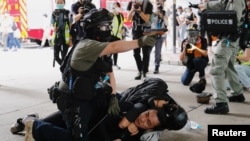ຕໍາຫລວດຮົງກົງໄດ້ຈັບກຸມຄົນ ພາຍໃຕ້ກົດໝາຍ ຄວາມໝັ້ນຄົງແຫ່ງຊາດໃໝ່ ທີ່ວາງອອກມາໂດຍລັດຖະບານກາງຂອງຈີນ ເປັນຄັ້ງທໍາອິດໃນວັນພຸດວານນີ້.
ຜູ້ຊາຍຄົນນຶ່ງ ແລະແມ່ຍິງຄົນນຶ່ງທີ່ຖືປ້າຍເອກະລາດຂອງຮົງກົງໄດ້ຖືກຈັບຢູ່ໃນ ຄົນລະເຫດການ ບໍ່ພໍເທົ່າໃດຊົ່ວໂມງຫລັງຈາກກົດໝາຍໃໝ່ເລີ້ມມີຜົນບັງຄັບໃຊ້ ນັ້ນ.
ຢ່າງໜ້ອຍ 70 ຄົນທີ່ເຂົ້າຮ່ວມໃນການປະທ້ວງເປັນກຸ່ມໃຫຍ່ອັນນຶ່ງ ທີ່ໄປໂຮມ ຊຸມນຸມກັນຢູ່ອ່າວຄອສເວ (Causeway) ຂອງຮົງກົງ ໄດ້ຖືກຈັບກຸມພາຍຫລັງ ທີ່ຕໍາຫລວດປາບການຈາລະຈົນໄດ້ສີດນໍ້າໃນທໍ່ໃຫຍ່ໆ ແລະສີດສະເປໝາກເຜັດໃສ່ ເພື່ອໃຫ້ຝູງຄົນແຕກສະຫລາຍກັນອອກໄປ. ຕໍາຫລວດເວົ້າວ່າ ພວກເຂົ້າຮ່ວມການປະທ້ວງໄດ້ຖືກຕັ້ງຂໍ້ຫາວ່າພາກັນໄປໂຮມຊຸມນຸມໂດຍບໍ່ຖືກຕ້ອງຕາມ ກົດໝາຍ ຊຶ່ງເປັນການລະເມີດຕໍ່ກົດໝາຍຄວາມໝັ້ນຄົງແຫ່ງຊາດໃໝ່.
ກົດໝາຍດັ່ງກ່າວມີຜົນບັງຄັບໃຊ້ໃນວັນຄົບຮອບ 23 ປີ ທີ່ອັງກິດໄດ້ມີການມອບໂອນຮົງກົງໃຫ້ແກ່ປັກກິ່ງ. ພວກເຈົ້າໜ້າທີ່ຂອງເມືອງດັ່ງກ່າວໄດ້ຫ້າມບໍ່ໃຫ້ ມີການໂຮມຊຸມນຸມປະຈໍາປີເພື່ອລະນຶກເຖິງວັນຄົບຮອບການມອບໂອນດັ່ງກ່າວ, ໂດຍອ້າງເຫດຜົນວ່າ ມີຄວາມສ່ຽງຈາກການລະບາດຢ່າງໜັກຂອງໄວຣັສໂຄ ໂຣນາ.
ກົດໝາຍໃໝ່ດັ່ງກ່າວທີ່ໄດ້ຮັບການອະນຸມັດໃນວັນອັງຄານຜ່ານມາໃນນະຄອນ ຫລວງປັກກິ່ງໂດຍຄະນະປະຈໍາການຂອງສະພາປະຊາຊົນແຫ່ງຊາດຈີນ ແລະ ໄດ້ເຊັນໃຫ້ເປັນກົດໝາຍໂດຍປະທານປະເທດສີຈິ້ງຜິງນັ້ນ ຮຽກຮ້ອງໃຫ້ລັດຖະ ບານກາງ ສ້າງຕັ້ງຫ້ອງການຮັກສາຄວາມໝັ້ນຄົງຂອງຊາດຢູ່ໃນຮົງກົງ ເພື່ອ ແນໃສ່ປາບປາມການໂຄ່ນລົ້ມອໍານາດຂອງລັດຖະບານ, ການກໍ່ການຮ້າຍ, ການແບ່ງແຍກດິນແດນ ແລະການສົມຮູ້ຮ່ວມຄິດກັບກໍາລັງຂອງຕ່າງປະເທດ.
ຜູ້ໃດກໍຕາມທີ່ໄດ້ຖືກຕັດສິນວ່າມີຄວາມຜິດຢູ່ພາຍໃຕ້ກົດໝາຍດັ່ງກ່າວ ອາດຈະ ຖືກຄຸກເປັນເວລາດົນ ນັບແຕ່ສອງສາມປີ ຫາຕະຫລອດຊີວິດກໍເປັນໄດ້ ແລະ ສາມາດຖືກສົ່ງຕົວໄປຫາຈີນແຜ່ນດິນໃຫຍ່ເພື່ອດໍາເນີນຄະດີ.
ຫົວໜ້າບໍລິຫານຂອງຮົງກົງ, ທ່ານນາງ ແຄຣຣີ ແລມກ່າວຢູ່ໃນພິທີລະນຶກເຖິງ ວັນຄົບຮອບການມອບໂອນຮົງກົງນັ້ນວ່າ ການຮັບຮອງເອົາກົດໝາຍດັ່ງກ່າວ ເປັນການພັດທະນາທີ່ສໍາຄັນທີ່ສຸດສໍາລັບສູນກາງການເງິນແຫ່ງນັ້ນ.
ພວກນັກເຄື່ອນໄຫວສົ່ງເສີມປະຊາທິປະໄຕໃນຮົງກົງ, ຕະຫລອດທັງຢູ່ໃນສະຫະ ລັດ ແລະປະເທດຕາເວັນຕົກອື່ນໆ ເວົ້າວ່າ ກົດໝາຍດັ່ງກ່າວບ່ອນທໍາລາຍແນວ ຄວາມຄິດຂອງ “ການເປັນປະເທດດຽວມີສອງລະບົບ” ທີ່ເປັນພາກສ່ວນນຶ່ງຂອງ ຂໍ້ຕົກລົງ ໃນການມອບໂອນໃນປີ 1997 ທີ່ໄດ້ຮັບປະກັນວ່າໃຫ້ຮົງກົງ ມີສິດໃນ ການປົກຄອງຕົນເອງໃນລະດັບສູງ ແລະມີອິດສະລະພາບຂອງພົນລະເມືອງໄປ ຈົນຮອດ 50 ປີ.
ອ່ານຂ່າວນີ້ເພີ້ມເປັນພາສາອັງກິດຢູ່ລຸ່ມນີ້
Hong Kong police made their first arrests Wednesday under a new national security law imposed by China’s central government.
A man and a woman holding Hong Kong independence signs were arrested in two separate incidents hours after the new law took effect.
And at least 70 people who were part of a large protest group that had gathered in Hong Kong’s Causeway Bay were arrested after riot police fired water cannon and pepper spray to break up the crowd. Police said the participants were charged with unlawful assembly to violation of the new national security law.
The law took effect on the 23rd anniversary of Britain’s handover of Hong Kong to Beijing. City authorities had banned the annual rally marking the anniversary of the handover, citing risks of the coronavirus pandemic.
The new law, approved Tuesday in Beijing by the Standing Committee of China’s National People’s Congress and signed into law by President Xi Jinping, calls for the central government to establish a national security office in Hong Kong aimed at confronting subversion of state power, terrorism, separatism and collusion with foreign forces.
Anyone convicted under the law could face anywhere from a few years to life in prison, and could be extradited to mainland China to stand trial.
Hong Kong chief executive Carrie Lam said the law’s enactment was the most important development for the financial hub at a ceremony marking the anniversary.
Pro-democracy activists in Hong Kong, as well as the United States and other Western nations, say the law undermines the “one country, two systems” concept that was part of the 1997 handover deal, which guaranteed the city a high degree of autonomy and civil liberties for 50 years.
The new law caps President Xi’s aggressive efforts to tighten control over the financial hub over the past few years, which has led to massive street protests by pro-democracy activists seeking greater freedoms for Hong Kong. The city was rocked during the second half of 2019 by angry and often violent demonstrations sparked by a controversial extradition bill that was eventually withdrawn.
The action by the Chinese legislature bypasses Hong Kong’s legislature, which has the authority to pass any security laws under the Basic Law, the city’s constitution. Hong Kong lawmakers have been pressured by Beijing in the past to approve a national security law, but were met by heavy protests.





